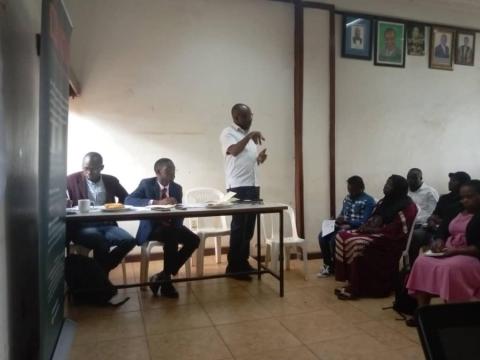
Awareness about refugee policies, their rights and responsibilities is still a critical area if we are to attain a dignified life for refugees living in Kampala City. A mapping exercise conducted by PLAVU in 2022 indicated that integration of refugees is still slow and therefore they cannot fully assimilate within the communities they live. This has left the refugees exposed to a challenge of discrimination. Language barriers and discrimination is highly hindering refugees to access job opportunities.
It is in this context that The International Rescue Committee (IRC) / IKEA Foundation and Platform for Vendors (PLAVU), under the Re: Build programme partnership, jointly conducted an awareness training activity in refugee policy, rights and responsibilities at the at Lubaga Division Headquarters. This training, which was done on on 3rd August 2023 under the Re: Build project partnership, benefited selected village local Council leaders (LC1) of Lubaga division.
It should be noted that refugees are by law entitled to fair and just treatment just like any other community member. But often this is not the case. Therefore understanding and enforcing refugees policies, rights and responsibilities is a very important skills area that Re: Build partners needed.
Targeting this awareness skills area to local leadership where refugees live provide a vital space for discussion of urban refugee self-reliance. Equally important to note is that local Council leaders are important grassroots leaders to bring a long lasting effect and take forward the community advocacy to promote social cohesion between host communities and refugees.
In addition to the village local leaders, the training also targeted other stakeholders particularly selected refugees, leaders of RLOs, representatives for vendors and host community opinion leaders. The selection of participants was based on the areas with most urban refugees.
Fifty three (53) persons benefited from this training. Of these 32 (60.3%) were males and 21 (39.7%) were females. 23 od the participants (16 males and 7 females) were local leaders, 16 (11 males and 5 females) were refugees and 14 (5 males and 9 females) were KCCA lubaga division officials.
Mr. Moses Odokonyero, from IRC, introduced Re: Build programme as Refugees in East Africa, Boosting Urban Innovations for Livelihoods and Development (RE: BUILD). He said that because anyone can become a refugee, we should all act humanely towards refugees. We need to support them to access employment by writing for them recommendation letters.
The town clerk; John Bosco Basinyoli said that the division needs “to organise a fora where all development partners come together to harmonise all the interventions and avoid duplication. He was also concerned about, “refugees involved in business who operate without license and who never follow all the required regulations guiding businesses in the city. In Uganda, one is required to pay for license before opening up any business” he warned.
The facilitator, Tina Kalitani from IRC, highlighted the key institutions responsible for refugees. She said that the country is responsible for the welfare of the refugees and because of that, the Office of the Prime Minister (OPM) department of refugees is responsible for this vulnerable category of people. Other institutions noted were the security organs- particularly the Police. The international community such as UNHCR are partners who only support this problem.
This was a vital highlight to the participants who often question where they report in case of refugee matters.
Other key issues highlighted from the activity are:
- Refugee identification is still a major challenge and a talking point. Community members could not differentiate between asylum seekers and refugees. There are also people without any form of identification and are all branded as refugees. There are also people who fraudulently access documentations. The question that remains is how do we solve the question of identification?
- Understanding and making use of the refugee policy and laws is still a complex area that needs demystifying and breaking down to make it more user friendly,
- Corruption is still a complex and major problem faced by host community members.
For more highlights from the activity, the detailed actiivty report can be obtained from the PLAVU office.
